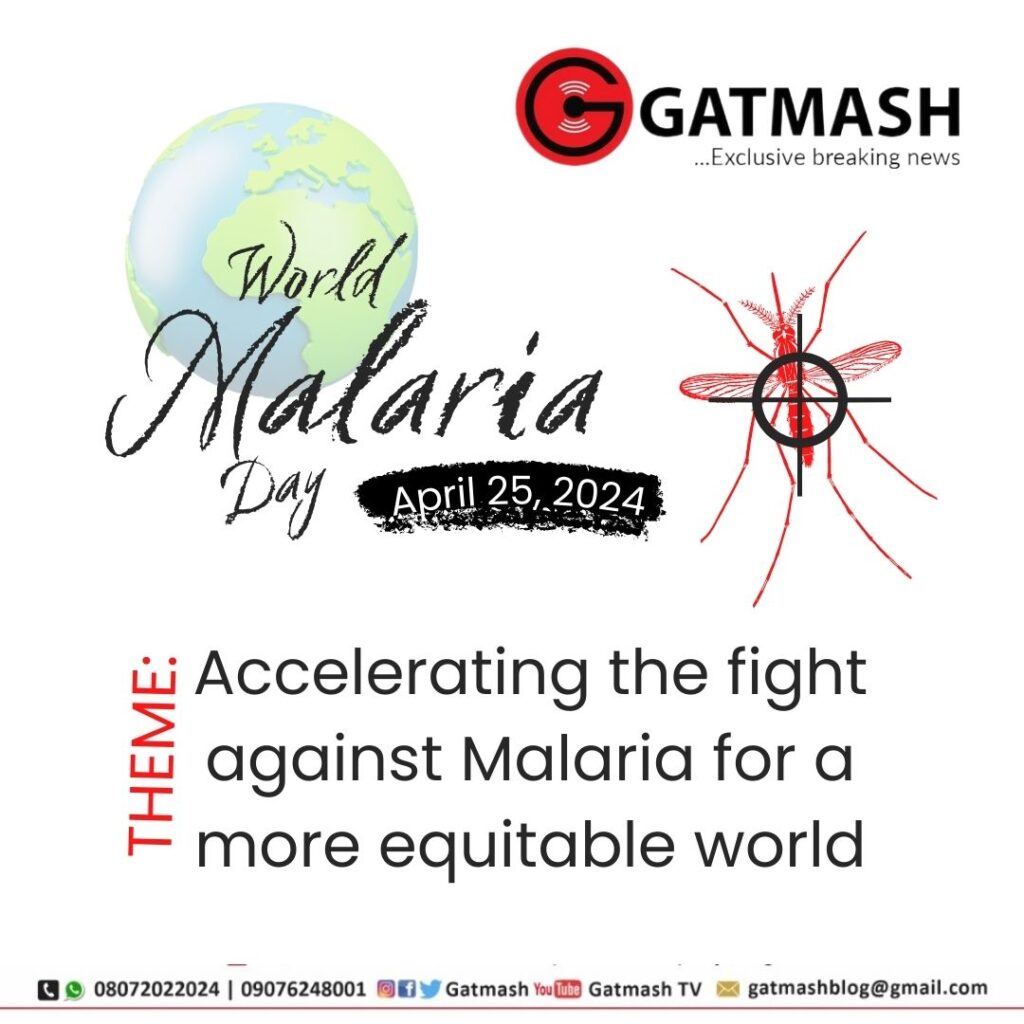By Theresa Moses

As a journalist, I grew up believing a4 common myth: that is, my genotype, AA, made me more prone to malaria. But as I dove deeper into the facts and figures, I discovered a more complex story. That malaria mostly spreads to people through the bites of some infected female Anopheles mosquitoes and factors such as environmental conditions, lack of access to preventive measures, and individual’s immune response which plays a more significant role in determining susceptibility to the disease.
On this 2024 World Malaria Day, let’s shatter the myths and accelerate the fight against this deadly disease for a more equitable world.
The Staggering Toll of Malaria

The staggering toll of malaria on children under five is a stark reminder of the urgent need for action. With nearly one child succumbing to malaria every minute, the gravity of the situation cannot be overstated. In 2022 alone, 249 million malaria cases globally resulted in 608,000 deaths, with a staggering 76 per cent of these fatalities occurring in children under five years of age. This translates to over 1,000 young lives lost daily to a preventable and treatable disease.
Malaria remains a pressing public health priority, demanding concerted efforts and resources to combat its devastating impact. With the data provided by UNICEF’s global databases for 2023, it is evident that urgent action is required to prevent needless deaths and alleviate the burden of malaria on vulnerable populations, particularly children, mostly in sub-Saharan Africa. The myth that genotype determines susceptibility has led to complacency and misinformation.
Debunking the Myths
The truth is that anyone can suffer from malaria, regardless of genotype or blood group. In fact, the World Health Organisation (WHO) states that 95 per cent of malaria cases occur in Africa where poverty, lack of access to healthcare, and poor sanitation create a perfect storm for the disease to thrive. Four African countries accounted for just over half of all malaria deaths worldwide: Nigeria (26.8 per cent), the Democratic Republic of Congo (12.3 per cent), Uganda (5.1 per cent), and Mozambique (4.2 per cent).
Breakthroughs in Medical Research

Breakthroughs in medical research and technology offer hope. New treatments like Artesunate have significantly reduced mortality rate. Artemisinin-based combination therapy (ACT) stands as the frontline treatment for combating P Falciparum, the deadliest strain of malaria prevalent in sub-Saharan Africa. Its effectiveness in targeting this lethal parasite underscores its significance in malaria treatment.
As a combination therapy, ACT combines artemisinin derivatives, known for their rapid parasite clearance, with partner drugs to ensure complete eradication of the parasite and reduce the risk of resistance development. This approach has been instrumental in saving lives and curbing the spread of malaria, making ACT a cornerstone in the fight against this devastating disease in the region.
Innovative Vector Control Methods

Innovative vector control methods, such as genetically modified mosquitoes, hold promise for curbing the transmission of malaria. These genetically engineered mosquitoes are designed to reduce mosquito populations or render them unable to transmit the malaria parasite. By targeting the vector responsible for transmitting the disease, such interventions offer a novel approach to controlling malaria transmission and complement existing strategies in the global fight against this deadly disease.
Global Efforts and Challenges
Global efforts have yielded a significant reduction in malaria cases, with a 41% decline since 2000. Despite this progress, persistent funding gaps and a lack of political will pose serious threats to sustaining and accelerating these gains. Continued investment in malaria control programmes, alongside robust political commitment, is essential to maintain momentum and achieve the goal of malaria elimination. Failure to address these challenges risks reversing the hard-won progress made in the fight against malaria.
Equity and Access
Malaria disproportionately burdens marginalised communities, perpetuating cycles of poverty and inequality. To effectively combat this disease, it is imperative to prioritise equitable access to healthcare, education, and resources. By addressing the underlying social determinants of health and ensuring that vulnerable populations have access to preventive measures, diagnosis, and treatment, we can break the cycle of malaria transmission and alleviate the burden on disadvantaged communities. This approach fosters a more just and equitable society while advancing progress towards malaria elimination.
Call to Action
Let’s accelerate the fight against malaria by:
– Supporting evidence-based initiatives
– Addressing systemic inequalities
– Promoting awareness and education
– Funding research and development.
On this World Malaria Day, let’s shatter the myths and misconceptions surrounding this deadly disease. Together, we can create a more equitable world where no one dies from a preventable and treatable disease like malaria.
Share your story or I Witness Reports with us 24/7 via SMS/Whatsapp: +234(0)8072022024, Email: [email protected], follow us on our social media platforms: X (formerly Twitter), Instagram, Facebook: @Gatmash, and subscribe to our YouTube channel: Gatmash TV.
Gatmash News is one of the most sought-after news portals, with an increasing audience and exclusive breaking news and reports across the globe. Plus more. Website: https://gatmash.com
For ad placement, contact us today via email at [email protected] or call our hotlines at +234(0)8072022024.





